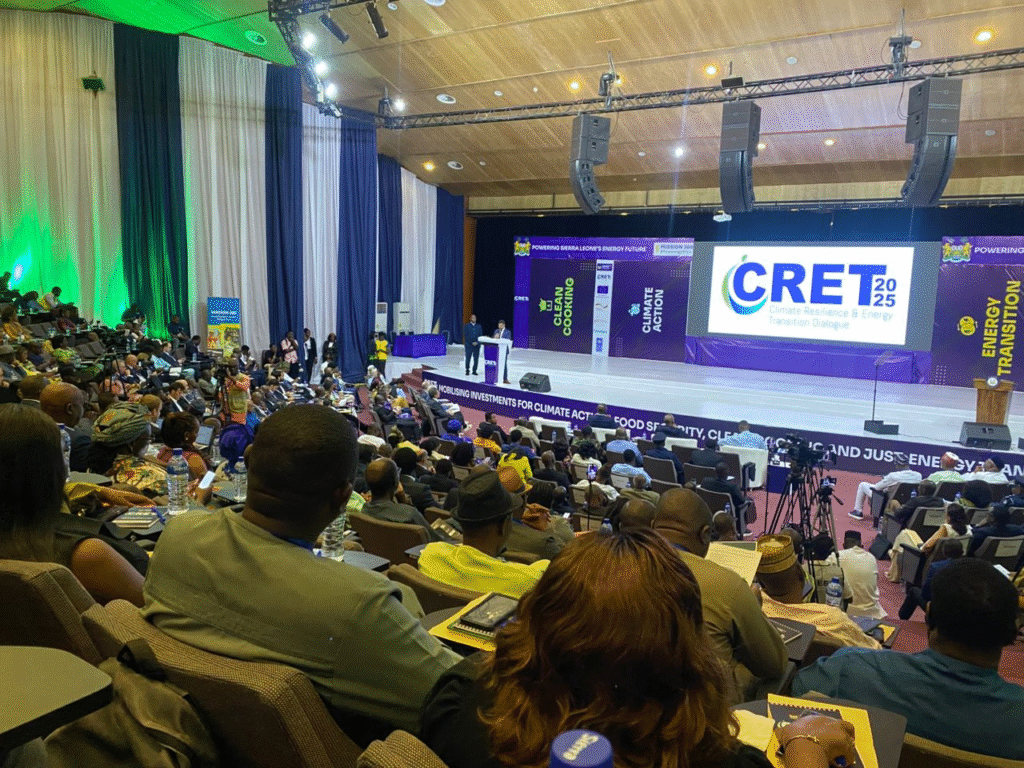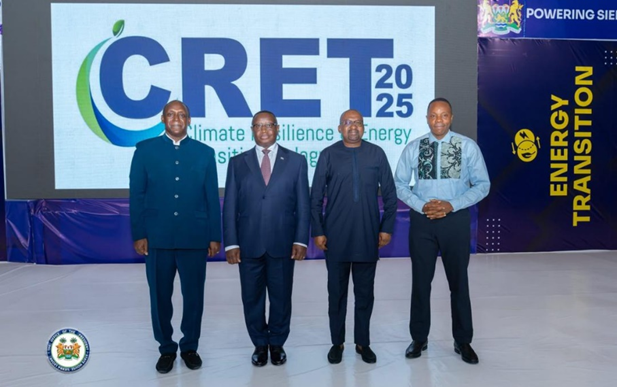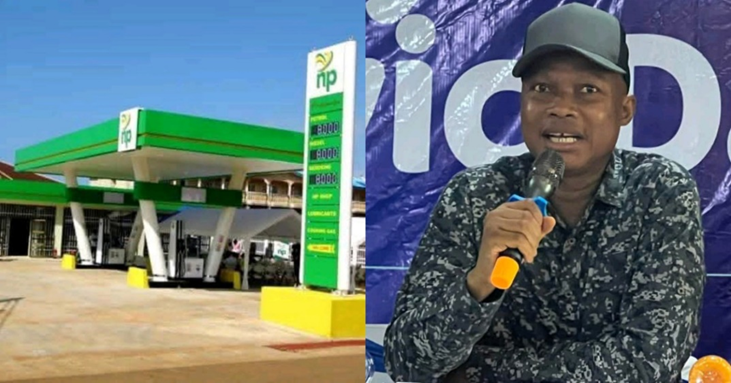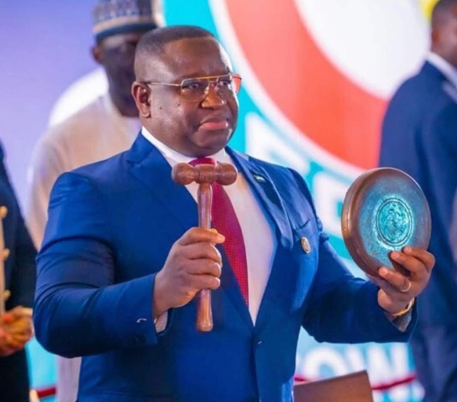Sierra Leone Charts Path for Sustainable Energy Future
By Mackie M. Jalloh
In an era when climate urgency demands bold action, Sierra Leone has stepped forward as one of Africa’s most ambitious voices for sustainable transformation. The country’s capital recently hosted the third edition of the Climate Resilience and Energy Transition Dialogue (CRET 2025) — a two-day national and international gathering that fused political will, innovation, and investment commitments into a united vision: making energy access and climate resilience the cornerstone of Sierra Leone’s development agenda.
Convened by the Presidential Initiative on Climate Change, Renewable Energy, and Food Security (PI-CREF), CRET 2025 was more than just another conference. It became a rallying point for global and African partners, bringing together government leaders, private sector executives, financiers, and civil society voices to confront the shared challenge of sustainable growth under the theme: “Mobilizing Investments for Climate Action, Food Security, Clean Cooking, and a Just Energy Transition for All.”
From the opening to the closing sessions, the message resonated clearly — Sierra Leone’s energy revolution is not a dream deferred; it is happening now.
President Dr. Julius Maada Bio, in his keynote address, set the tone for what many described as one of the most decisive climate dialogues in Sierra Leone’s history. With his characteristic pragmatism, he emphasized that the nation’s green transition must be “practical, deliberate, and people-centered.”
“When we initiated the energy dialogue in 2023,” President Bio recalled, “our vision was not just to talk about sustainability — it was to act, to design measurable goals and deliver results that transform the lives of our citizens.”
He unveiled Sierra Leone’s Energy Transition and Green Growth Plan, a blueprint that links renewable energy access to food security, sustainable agriculture, and economic empowerment. A central pillar of this plan is Mission 300, Sierra Leone’s bold energy compact endorsed in September 2025 — the most comprehensive investment package in the nation’s history. The mission aims to connect 720,000 new households to reliable electricity, driving both economic opportunity and environmental protection.

President Bio also announced major infrastructure projects designed to anchor this transformation, including the 40-megawatt Regional Emergency Solar Intervention Project (RESPITE), the 20-megawatt solar plant at Kibibi, and future installations in Eugene and Long Bay. “Energy access,” he declared, “is not a privilege. It is the foundation of our collective prosperity and climate resilience.”
The President further linked energy reform to governance, stressing transparency, efficiency, and inclusivity. “Our policies are credible, our institutions are capable, and our national vision for energy security is achievable,” he said, to loud applause from the audience.
He commended his administration’s push for clean cooking technologies, referencing the National Clean Cooking Strategy and the ECOWAS LPG 2020 Initiative. These programs, he noted, go beyond energy—they safeguard health, forests, and the livelihoods of women. He praised First Lady Fatima Bio for her advocacy in ensuring women’s access to energy and leadership in sustainable development.
Dr. Kandeh Kolleh Yumkella, Chairman of PI-CREF, echoed the President’s optimism, hailing the role of international cooperation in powering Sierra Leone’s clean energy transition. “When we talk about Mission 300,” Yumkella said, “we’re not just talking numbers — we’re talking lives, opportunity, and dignity for our people.”
He highlighted landmark partnerships with Scatec (Norway), Africa50, and the Hackett Group, all of which are investing heavily in renewable energy. Together, these projects are expected to deliver up to 90 megawatts of clean power in the next phase.
Representatives from development partners reaffirmed their support. The African Development Bank (AfDB), represented by Ms. Halima Hashi, announced that its active portfolio in Sierra Leone now exceeds $208 million, targeting energy, agriculture, transport, and water. “Sierra Leone has evolved into a credible voice in Africa’s clean energy agenda,” she said. “This dialogue demonstrates the country’s resolve to anchor its economic future in sustainability.”
The World Bank’s Country Manager, Mr. Abdu Muwonge, pledged to back new initiatives including an 80-megawatt renewable project by 2027, aligning with Mission 300’s goals.
Dr. Dymphna van der Lans, CEO of the Clean Cooking Alliance (CCA), commended Sierra Leone’s leadership. “Transitioning to clean cooking fuels is a matter of climate justice and public health,” she said, describing the creation of a Clean Cooking Delivery Unit within the Office of the President as “a groundbreaking step for governance and accountability.”
As the curtains closed on Day Two, Vice President Dr. Mohamed Juldeh Jalloh delivered a reflective and inspiring closing statement, underscoring that the dialogue’s resolutions will be handed directly to President Bio for action. “Our energy transformation is no longer a distant goal — it is imminent,” he declared. “We have a credible, data-driven plan that will unlock private investment, expand infrastructure, and ensure no community is left behind.”
He tied Sierra Leone’s green agenda to its broader Human Capital Development policy, explaining how energy access fuels education, healthcare, and employment. “You cannot power schools, hospitals, or industries without reliable energy,” he said. “Energy is the backbone of our transformation.”
The Vice President spotlighted agriculture as the “engine of inclusive growth,” emphasizing that the government’s Feed Salone Initiative is designed to reduce food imports, stabilize prices, and empower farmers — all while promoting climate-smart agriculture.
He also called for deeper private sector participation, asserting that governments should increasingly act as facilitators rather than operators in the energy market. “If we want investors to come,” he said firmly, “we must guarantee transparency, accountability, and the rule of law.”
The two-day dialogue concluded with renewed pledges from international partners and local stakeholders to accelerate implementation of the CRET roadmap. Recommendations included creating a dedicated monitoring framework for energy reforms, scaling up climate finance mobilization, and expanding public-private partnerships.
By merging political vision with technical expertise and international solidarity, Sierra Leone is defining a new path — one where energy equity, climate resilience, and economic growth are interwoven.
As the final applause faded at the Freetown International Conference Center, one sentiment prevailed among attendees: Sierra Leone’s green transition is not just a national policy — it is a continental example of leadership, resilience, and shared prosperity.



